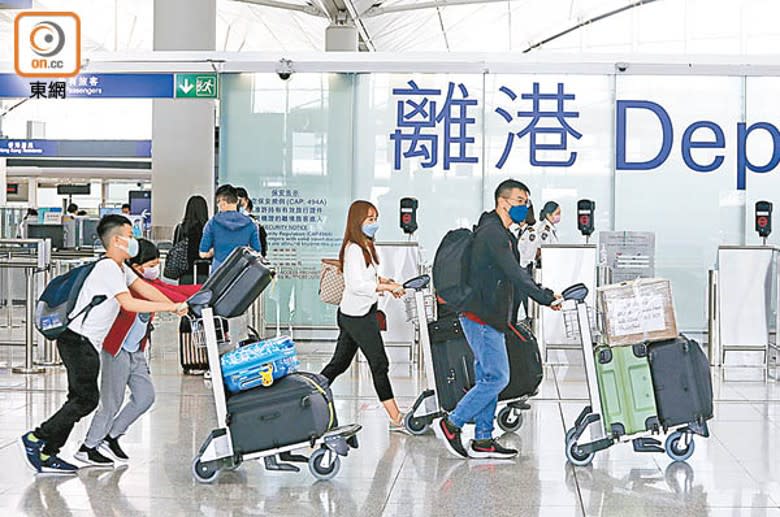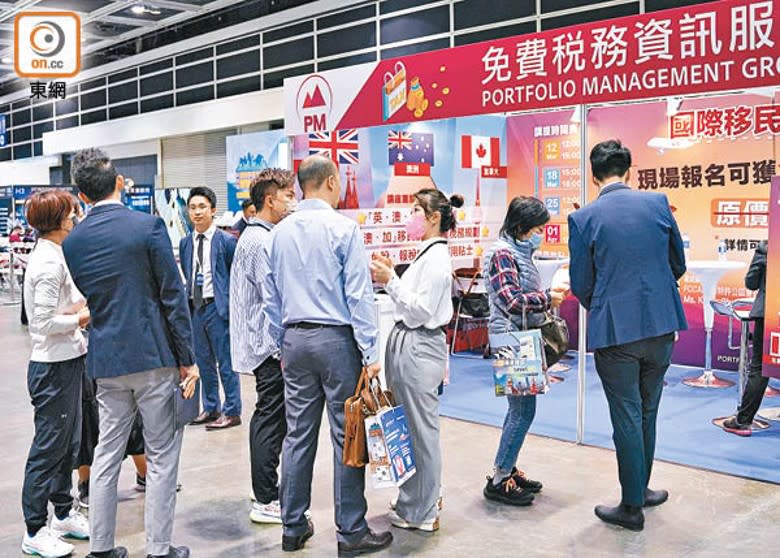In recent years, most of the professionals and the middle class have been pessimistic about the prospects of Hong Kong, thinking of emigrating. According to a survey by an immigration agency, more than 80% of the respondents plan to leave Hong Kong within two years, and about 42% of the respondents whose income is less than RMB 50,000 per month also intend to emigrate, reflecting that immigrants may not necessarily come from wealthy families. The wave of immigration has also led to the problem of leaving the elderly and the elderly in Hong Kong. Some immigration consultants pointed out that most families will not emigrate overseas with their elderly parents, leaving the elderly alone to suffer in Hong Kong and increasing social burdens.
The “International Immigration and Property Expo” is being held at the Wanchai Convention and Exhibition Center. The exhibition has been held again in less than a year. About 35,000 people have registered for two consecutive days, an increase of 30% compared with last year. The organizer released the results of the latest “Hong Kong Citizens’ Immigration Intention Survey”. As many as 85% of the participants expressed their intention to leave Hong Kong within two years. According to the organization, the desire of Hong Kong people to immigrate continues unabated. It is believed that the airport will resume full operation and customs clearance between Hong Kong and overseas , within half a year is the peak wave of immigration from Hong Kong. The destination most interested in immigrating is the United Kingdom, with 38%; 21% of the respondents intend to immigrate to Canada; and 17% of the respondents intend to immigrate to Australia. The agency believes that the main reason why the UK has become the preferred country for Hong Kong people to emigrate is because the British government has implemented the “BNO 5+1” policy.
The survey also shows that families with a monthly income of “150,000 yuan or more” have a greater tendency to immigrate, accounting for 36%, while families with a lower monthly income of “20,000 to 50,000 yuan” and “below 20,000 yuan” also have a greater tendency to immigrate. Accounted for 23% and 19% respectively. According to the agency, the figures reflect that ordinary families also intend to immigrate, and emigrating to other countries is no longer just a monopoly of wealthy families.
Foreign tax issues are often ignored
Peter Tse, director of the International Immigration and Property Expo, pointed out that many countries have changed their immigration policies last year. For example, Ireland and Portugal have canceled golden visas, and the United Kingdom has tightened visa applications for some people. These have stimulated Hong Kong people to speed up immigration deployment. He also said that before Ireland canceled the investment application, the inquiry and application rate increased by nearly 3 times. The reduction in asset requirements, coupled with the increase in the average education level of Hong Kong people, has reduced the language barrier and made it easier to connect with overseas employment. This is also one of the main reasons why Hong Kong people consider immigration.
In terms of taxation, Tse Pei-ho said that the most often neglected consideration by Hong Kong people is mainly taxation issues. Due to the simple local tax system, many foreign taxes are very unfamiliar to Hong Kong people, such as property appreciation tax and inheritance tax. Some countries even collect taxation on overseas income from immigrants (global taxation), and assets, dividends, and sideline income all need to be reported.
He suggested that Hong Kong people need to have a clear understanding with experienced immigration companies and accountants before immigrating, and properly handle tax clearance, MPF, insurance and other items, which can greatly reduce the pressure of remote processing after immigration. In addition, pet immigration is also a worry for many planners. Xie said that except for designated species that are not subject to treatment, as long as the documents and epidemic prevention records are prepared in advance, the progress of immigration will generally not be hindered.
Leaving elderly parents to continue living in Hong Kong
Zhang Jiaxi, director of Huankai Immigration Consulting Co., Ltd., said that in recent years, other countries have introduced “lifeboat” immigration policies, hoping to attract young people to emigrate overseas, such as young people who have just completed their studies. After immigration, elderly parents will continue to stay. situation in Hong Kong. Many immigrant families are grouped together as a “nuclear family,” that is, an applicant, his or her spouse, and their children under the age of 18. He estimates that the vast majority of immigrant family members do not necessarily include their parents.
Zhang Jiaxi believes that if there are brothers and sisters in the family who are still in Hong Kong, they can help take care of the elderly living in Hong Kong; otherwise, they may increase the social burden. He suggested that the government or social workers could provide appropriate assistance to the elders concerned.




